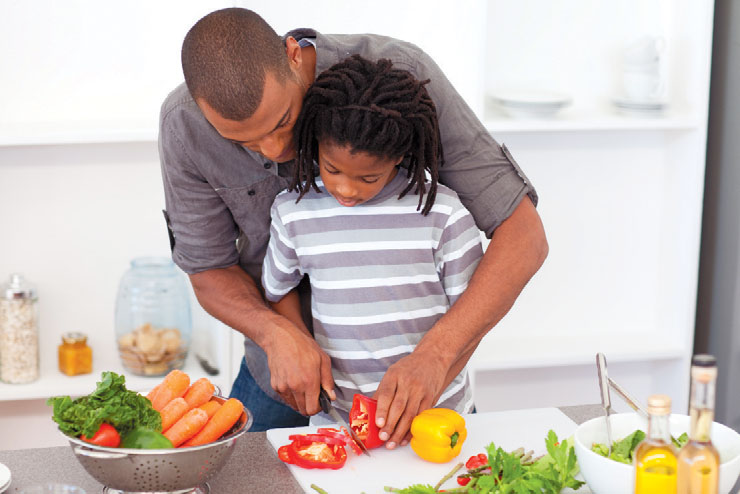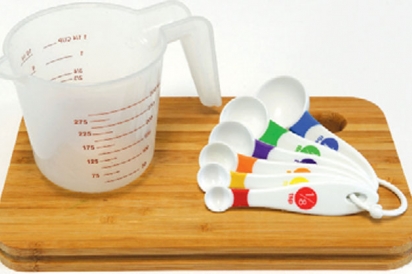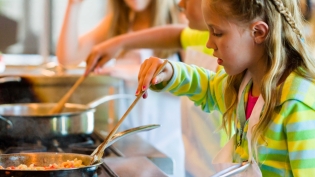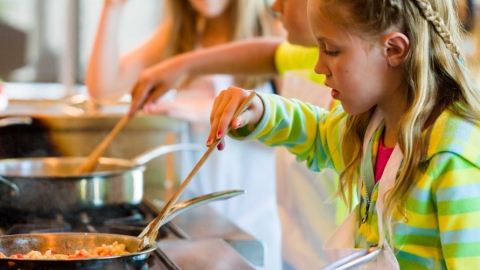Kids in the Kitchen
A FULL MENU OF USEFUL LESSONS AWAITS YOUNG COOKS
When our two daughters were young, my husband and I took turns waking up early on weekend mornings to prepare breakfast for them. The girls were certainly capable of filling bowls with cereal and pouring in milk by the time they were 3 years old, but we were reluctant to allow them to be on their own lest they get into mischief. So we watched, bleary-eyed, as they assembled breakfast for themselves.
Actual cooking, which involves sharp instruments and heat, came much later for my kids. (Regrettably maybe too much later: One daughter had the gas to her stove turned off to save money when she first lived on her own—apparently she didn’t do much cooking!)
These days, children with a gift for cooking are showing up on television cooking shows. Gordon Ramsay, restaurateur and TV personality, hosts a cooking competition show (“Master Chef Junior”) featuring kids who know how to cook foie gras and make Hollandaise. Kids, some as young as 11, demonstrating very advanced skills. I’ve only watched a few episodes but those kids are very impressive.
The Food Network has also recently added kids’ cooking competitions to its lineup of shows. If you haven’t already watched any of these you’re missing something. These kids are not just cute, they can cook. The pre-teens have enough cooking science knowledge and knife skills to embarrass most of us home cooks.
Although there are a few young culinary superstars out there, let’s face it: Many kids are often reluctant to try new foods, especially if the texture or color or odor are off-putting to a young child’s sensibilities. If they prepare the food themselves, they might be more apt to taste it. You still might get a crinkled nose and negative remark but at least they’ve tried it.
Most children are more interested in eating than in cooking, but at some time they will be on their own, and knowing how to boil water could prove to be a very important skill. Even if your kids help out in the kitchen now, learning from cooking school teachers along with other kids is a great way to spend a weekend during the school year or a few weeks over the summer.
Maybe you’re not a happy cook who enjoys hours of chopping, slicing and dicing—so why ask your kids to suffer through the drudgery? Well, they might actually like it even though you don’t, and cooking could become a life-long passion. Most importantly, though, there are skills to be learned that may help them as they grow that don’t even have much to do with culinary competence.
Linda Hopkins owned Les Petites Gourmettes, a cooking school in Scottsdale offering kids classes, for 18 years before hanging up her teaching toque to focus on her cooking, entertaining and recipe blog (lespetitesgourmettes.com). She made sure that her students left with competencies that would serve them throughout their lives.
Hopkins says, “Skills that are naturally learned while cooking are math, reading, sequencing and following directions, problem solving, communication, cooperation, increased self-esteem, improved vocabulary, organization, making predictions, increased creativity, healthy eating, responsibility, sharing, improved fine motor skills. I always made sure to incorporate safety, cleanliness, knife skills, taste and seasoning, proper measuring of wet and dry ingredients, proper use of small electrics, stoves and ovens.”
Maggie Norris from Whisked Away, a cooking school in Arcadia, takes kids as young as 3 years old for some of her programs. She helps the very young children develop confidence in the kitchen, teaches them table manners and skills like cracking an egg and stirring ingredients. Kids age 7 and up learn more advanced skills including setting a table. Who wouldn’t want their kids to know how to set a table or which fork to use for salad?
Martie Sullivan, owner of Sweet Basil Gourmetware and Cooking School in Scottsdale, offers parent/kid classes and a summer camp program for kids. The kids learn to cook foods most kids like to eat, like grilled cheese and pizza.
Shops like Williams-Sonoma and Sur La Table offer kids classes all year, many with holiday themed programs. At Sur La Table, children can learn food chemistry and vegetarian cookery. A typical three-day program over the winter holiday included pasta making, wok cooking and cake decorating.
Even supermarkets, like Fry’s in Paradise Valley, are offering cooking opportunities for children. The Fry’s at Tatum and Shea, offers weekend and holiday classes for kids 6 to 18.
At the Classic Cooking Academy in Scottsdale, children older than 13 are allowed to take classes along with their parents. Younger children can participate in culinary camp during the summer.
“Our culinary camp is a highlight for us each summer. We look forward to the same kids coming back year after year,” says Danielle Sanders, Classic Cooking Academy’s general manager.
Although it might be sad to think about your kids growing up and leaving home, they will one day be on their own. They should at least know how to make ramen noodles or a peanut butter sandwich, if not more advanced fare.
What Kids Can Learn From Cooking
Reading: Following written recipes improves reading. If the recipes have introductory paragraphs (called headnotes), that’s even better.
Math: Increasing or decreasing servings helps with the dreaded fractions. Adding, subtracting, dividing are all part of making adjustments to recipes.
Science: Why does the water boil? What happens when you mix oil and vinegar (e.g., water) together? Why does the cake rise? What makes bread rise?
Organizational skills: One of the most important teachings is to read the recipe from beginning to end before starting and to prepare all the ingredients in advance (mise en place).
Cooking Skills by Age
(adapted from BBCgoodfood.com and Williams-Sonoma)
Preschoolers: washing fruits and vegetables; stirring ingredients; mashing with a fork or potato masher; weighing; mixing with spoon or hands; tearing herbs and lettuce; using a mortar and pestle; kneading; spreading peanut butter and jelly or butter on bread; using cookie cutters
6- to 8-year olds: cutting with a small knife; cutting with scissors; measuring; greasing a pan; peeling hard boiled eggs; setting the table; whisking; frosting; using a garlic press
9- to 12-year olds: planning meal; following a simple recipe; whisking; using oven and microwave; making salad; working with timers and thermometers; cooking pancakes and eggs; using a blender, microwave, food processor, stand mixer








